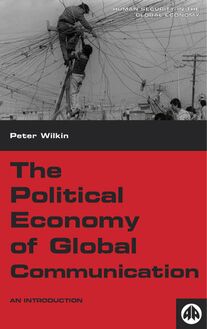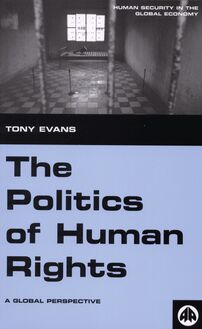The Politics of Human Rights , livre ebook
116
pages
English
Ebooks
2005
Vous pourrez modifier la taille du texte de cet ouvrage
Obtenez un accès à la bibliothèque pour le consulter en ligne En savoir plus
Découvre YouScribe en t'inscrivant gratuitement
Découvre YouScribe en t'inscrivant gratuitement
116
pages
English
Ebooks
2005
Vous pourrez modifier la taille du texte de cet ouvrage
Obtenez un accès à la bibliothèque pour le consulter en ligne En savoir plus
Publié par
Date de parution
20 mai 2005
Nombre de lectures
0
EAN13
9781783714872
Langue
English
Tony Evan's introduction to the politics of human rights examines the impact of globalisation on global human rights. He argues that the state’s role in protecting and promoting rights has been severely weakened under globalisation – and that the emerging global order may be a cause of many human rights violations. As the value of the market grows, the value of individual human rights decreases.
The Politics of Human Rights departs from traditional interpretations of human rights by focusing on the political economy of human rights, rather than on the philosophical or legal aspects.
Foreword
1. The Politics of Universal Human Rights
2. The Discourse of Universal Human Rights
3. International Human Rights Law and Global Politics
4. The Political Economy of Human Rights
5. Globalisation, Democracy and Human Rights
6. The Promise of Global Community and Human Rights
Bibliography
Index
Publié par
Date de parution
20 mai 2005
Nombre de lectures
0
EAN13
9781783714872
Langue
English
The Politics of Human Rights
Human Security in the Global Economy Series editor: Professor Caroline Thomas (University of Southampton)
Also available
African Democracies and African Politics M.A. Mohamed Salih
Global Governance, Development and Human Security The Challenge of Poverty and Inequality Caroline Thomas
The Political Economy of Global Communication An Introduction Peter Wilkin
The Politics of Human Rights
A Global Perspective
Second Edition
Tony Evans
First published 2001, second edition published 2005 by Pluto Press 345 Archway Road, London N6 5AA
www.plutobooks.com
Copyright © Tony Evans, 2001, 2005
The right of Tony Evans to be identified as the author of this work has been asserted by him in accordance with the Copyright, Designs and Patents Act 1988.
British Library Cataloguing in Publication Data A catalogue record for this book is available from the British Library
ISBN 978 0 7453 2374 9 Hardback
ISBN 978 0 7453 2373 2 Paperback
ISBN 978 1 8496 4279 8 PDF eBook
ISBN 978 1 7837 1488 9 Kindle eBook
ISBN 978 1 7837 1487 2 EPUB eBook
Library of Congress Cataloging in Publication Data applied for
10 9 8 7 6 5 4 3 2 1
Designed and produced for Pluto Press by Chase Publishing Services Ltd, Fortescue, Sidmouth, EX10 9QG, England Typeset from disk by Stanford DTP Services, Northampton, England Printed on demand and bound in the European Union by CPI Antony Rowe, Chippenham and Eastbourne, England
For Seth
Contents
Series Introduction
Preface
Introduction: Globalization and the Study of Universal Human Rights
1
The Politics of Universal Human Rights
2
The Discourse of Universal Human Rights
3
International Human Rights Law and Global Politics
4
The Political Economy of Human Rights
5
Globalization, Democracy and Human Rights
6
The Promise of Global Community and Human Rights
Bibliography
Index
Series Introduction
HUMAN SECURITY IN A GLOBAL ECONOMY
The idea for this series grew out of a panel on human security at the British International Studies Association conference (BISA) in December 1998. Panellists expressed concern at the silence of the International Relations discipline in the face of growing inequality and widespread poverty that characterized the era of neoliberal development. The uneven distribution of the benefits of the globalization process, and the general failure of that process to attend to the human security of the majority of humanity, were noted. There was a desire to remove the intellectual blinkers arising from an emphasis on a state level analysis and to put people first.
The series is concerned with the area of convergence between International Relations and Development Studies. In contrast to most International Relations series, which take the state as the central unit of analysis, this series gives primacy to human beings and their complex social, political, economic and cultural relations. Importantly, the concept of human security pursued here differs fundamentally from competitive, possessive notions of security of the individual conceived in the currently fashionable neoliberal sense. Rather, human security describes a condition of existence in which basic material needs are met and in which human dignity, including meaningful participation in the life of the community, can be met. Thus while material sufficiency lies at the core of human security, in addition the concept encompasses non-material dimensions to form a qualitative whole. Human security is oriented towards an active and substantive notion of democracy, and is directly engaged with discussions of democracy at all levels, from the local to the global.
The series investigates the causes of human insecurity and the pursuit of human security. For the majority of humankind, human security is pursued as part of a collective, most commonly the household, sometimes the community defined along other lines such as religion, caste, ethnicity or gender or a combination of these. States play a critical role in the achievement of human security; they have the authority and the responsibility to attend to the human security needs of citizens. State–society relations come up for scrutiny, as fundamental questions arise concerning state capacity, state legitimacy and state collapse. Global processes may impact on, even jeopardize human security; thus these processes and the global governance structures that drive them need investigation. Regional organizations and global governance institutions set and implement the global development agenda and the global security agenda. Private transnational banks and transnational corporations exert a huge influence. Indeed the development of the global economy requires us to consider humanity embedded not simply within discrete territorial states, but within a global social structure, the capitalist world economy that has been developing since the sixteenth century. The aim is the exposure of policies which undermine the fulfilment of human security and the articulation of processes, policies and practices which support it.
Preface
This volume is not intended for those who want to delve more deeply into the existing rules and practices of the international human rights regime. Nor will it offer a detailed overview of particular human rights violations or particular historic instances where violations of human rights have been widely reported. Instead, the arguments presented here focus on the global politics of human rights. To follow this path is to engage in debates about human rights as power and interests. This does not imply that the ‘power of human rights’ serves the interests of the dispossessed, the marginalized, the persecuted or the excluded alone. Rather, the discussion here looks at the interests associated with globalization, and the part that the discourse of universal human rights plays in legitimating those interests.
As feedback on the first edition indicates, few readers remain indifferent to the politics of human rights. For those committed to the current universal human rights regime, arguments over politics, power and interests have little part to play in the effort to promote and protect human freedoms. For this group, human rights are neutral claims that seek to protect everyone from a denial of their natural rights. The politics of rights is a distraction – perhaps a heresy – the pursuit of which can only damage the global project for human rights. For others, however, the politics of rights allows an insight into many aspects of the global discourse of human rights that remain a puzzle. Why, for example, does the human rights regime take the form that it does? Why is such stress given to civil and political rights? What is the relationship between the globalization of the political economy and human rights? Why do we invest so much faith in international law solutions for protecting human rights? Are human rights violations inevitable, given the current world order? For this second group, politics does not present a challenge to promoting human rights but, rather, an opportunity to understand the current status and authority of human rights globally.
Together with some minor revisions to the chapters that appeared in the first edition, this revised second edition includes a new chapter ( Chapter 2 ) that discusses the structure of the discourse of human rights, as it is practised today.
Introduction: Globalization and the Study of Universal Human Rights
The general theme of this series is human security, defined as something more than the conventional concept of military security that has dominated the literature on international relations for so long. Following the United Nations Development Programme’s (UNDP) definition, human security refers to ‘safety from the constant threats of hunger, disease, crime and repression’ and ‘protection from sudden and hurtful disruptions to the patterns of our daily lives – whether in the home, in our jobs, in our communities or in our environment’. Human security is not therefore only to do with cataclysmic political and international events, but with ‘job security, income security, health security, environmental security … [and] … security from crime’ (UNDP 1994). The UNDP confirmed this approach to human security in its tenth annual Human Development Report , which argues that security is concerned with ‘widening the range of people’s choices’ and the means by which ‘people can exercise their choices safely and freely’ (UNDP 1999: 36). Accordingly, the purpose of human security is to provide the conditions for people to exercise and expand their choices, capabilities and opportunities free of insecurity, so that they may build a future for themselves and their children (Salih 1998). Whereas military security is concerned with external threats to the state, human security takes a more people-centred focus, particularly the need to create the necessary economic, social and political conditions for people to lead a dignified life. While in the past it may have seemed possible to achieve these conditions largely within the domestic political arena, today, under conditions of globalization, which many argue is placing severe constraints on state authority, achieving human security demands action at the global level (Cox 1994; Gill 1996; Panitch 1995).
Human security is therefore broader than the tradition that understands political community through the language of the territorial state, sovereignty and strategic studies, which stresses the importance of defence, the military and interstate conflict. Instead, those with an interest in human security point to important features of the state and the interstate system that represent barriers to achieving the conditions for leading a dignified life within the emerging global order. For traditionalists, the state remains the central participant in finding solutions to the n

